Niall Ferguson: My Journey From a Jerusalem of Ghosts to the Living Jerusalem To make sense of this bloody year, I had to go back to Lithuania. By Niall Ferguson
To make proper sense of the bloody events of the past 12 months in the Middle East, I had to go to Vilnius.
That may strike you as bizarre, as Vilnius is the capital of Lithuania and roughly 1,600 miles from Tel Aviv. But Vilnius was once “the Jerusalem of the North”—that’s what Napoleon called it when he passed through in 1812.
It is a pretty city today, with all kinds of charming eighteenth- and nineteenth-century buildings, many of them creatively renovated since Lithuania regained its independence from the Soviet Union in 1991. Yet Vilnius is a city of ghosts. That so much of its baroque architecture survived the brutalities of first Soviet, then Nazi, then Soviet occupation is remarkable. The Jewish inhabitants were not so fortunate.
To understand Israel today, you must first understand what befell the Jews of Europe. It is the story of what can happen to a people without a nation state. It is the story of a people without an army of their own. And it is a story of what could happen again if the enemies of the Jewish people are given a chance, once more, to fulfill their fantasies.
What today is Vilnius was once Vilna, a part of the Pale of Settlement in the Tsarist empire, and then, between 1918 and 1939, Wilno in the Republic of Poland. The condition of much of the Jewish population was impoverished and insecure. A British member of Parliament who toured the Pale of Settlement in 1903 was appalled by Vilna’s “pestilent” cellars.
Yet the city was also the most important Jewish cultural hub in Eastern Europe—a center of Jewish learning and culture from the 1560s until the 1930s. The greatest Talmudic scholar of the eighteenth century, Elijah ben Solomon Zalman, was known as the Vilna Gaon. The man who pioneered the revival of Hebrew as a spoken language, Eliezer Ben-Yehuda, studied in Vilna. That cultural vitality did not abate after the city’s incorporation into the Polish republic. YIVO, the center for Jewish studies that is now based in New York, was originally founded in Wilno in 1925.
In 1939, when Poland was partitioned between Nazi Germany and the Soviet Union, the city was handed over to Lithuania. This seemed providential. For Jews fleeing Nazi and Soviet rule, Vilnius looked like a sanctuary. Indeed, many of the city’s Jews celebrated the end of Polish rule.
But the celebration was premature. In June 1940, along with neighboring Latvia and Estonia, Lithuania was annexed by the Soviet Union. A year later, the regime changed once again—this time fatally.
With the German invasion of the Soviet Union on June 22, 1941, the fate of the Jews of Vilnius was sealed. Between 190,000 and 196,000—more than 90 percent—of Lithuanian Jews were murdered: a higher share than in any other country the Nazis occupied. Their destruction was swift: Most Lithuanian Jews perished before the end of 1941.
Einsatzgruppe A was in charge of the “final solution” in Lithuania. But much of the killing in Lithuania was done by locals. The Jews of Vilnius were killed by their neighbors as much as by the invaders.
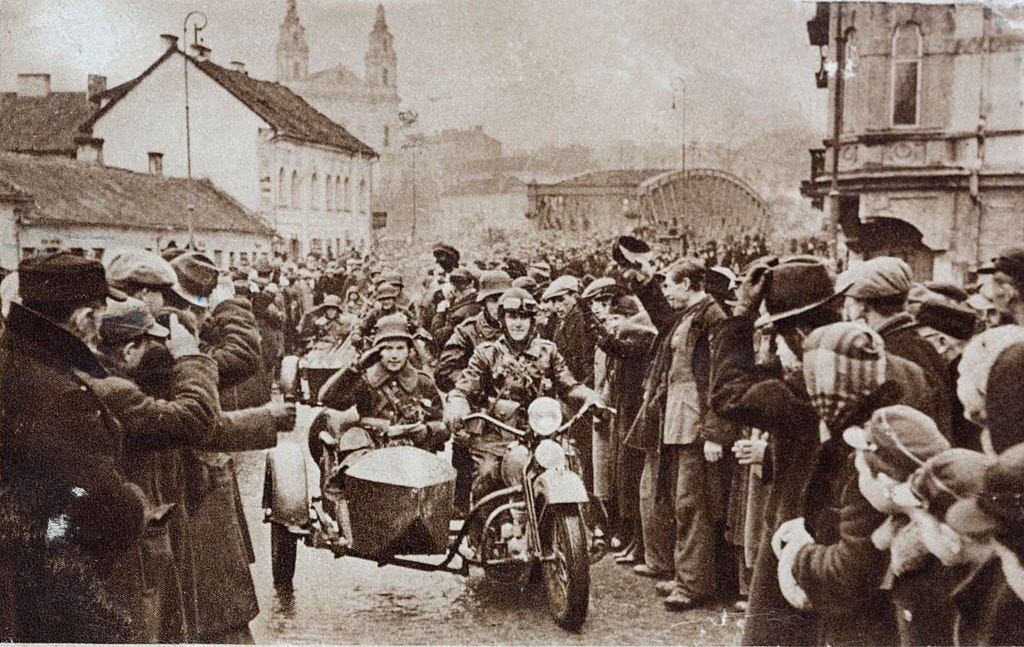
Nationalist underground posters proclaimed “the fateful and final hour. . . to settle our account with the Jews.” The most notorious Lithuanian perpetrators of the Holocaust were the Ypatingasis būrys (Special Squad), which was involved in slaughtering 72,000 Jews near the railway station at the Ponary forest (now Paneriai).
It was here that the Nazis first systematically murdered women and children as well as men. Most victims were marched from the city to Ponary and stripped before being shot. Gold teeth were yanked out. The killing squads piled the bodies into six large pits that had been excavated for oil storage tanks. It was such grisly work that the executioners had to be plied with alcohol by their officers. One German soldier who witnessed the slaughter could say only: “May God grant us victory because if they get their revenge, we’re in for a hard time.”
Almost no one escaped.
In his book Black Earth: The Holocaust as History and Warning, the historian Timothy Snyder tells the story of Oswald Rufeisen, a German-speaking Zionist who had fled to Vilnius from Poland in September 1939 and survived only by concealing his identity and working for both the Nazi police force in Belarus and the Soviet interior ministry and secret police, the NKVD. Few other Jewish witnesses survived.
Rufeisen’s recollections depict courage, ingenuity, and sheer luck in the face of unspeakable horror. While working in Nazi-occupied Belarus, he gave the Jews in the Mir ghetto not only warnings of impending “actions” against them, but also weapons stolen from the German Security Police commander in Mir, Reinhold Hein.
“In Meister Hein’s room was a locked cupboard full of arms—rifles, pistols, and hand grenades,” Rufeisen recalled. “Each time I took one of them and placed it among the plants in the garden, and when evening fell I brought it to Yisrael Reznik at the ghetto gates. In this way I handed over 12 rifles.” A Jewish boy named Leibel Itzkowitz, who worked in the German stables, would come to see Rufeisen every day after work. He would leave with “a bag full of bullets covered with a small amount of food.”
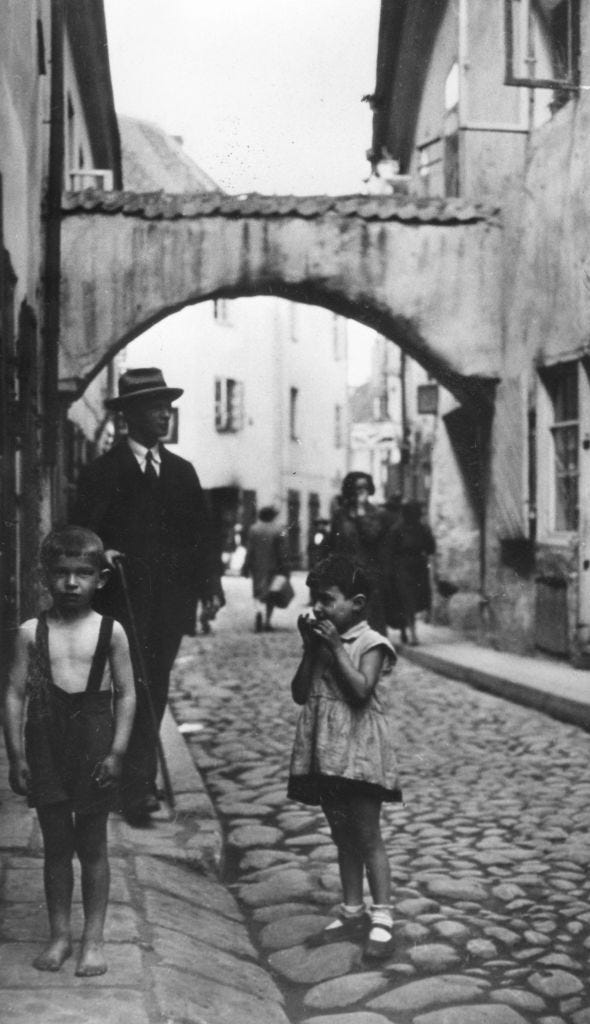
But resistance to the Holocaust on this paltry scale was futile. When he heard from Hein that the “liquidation” of the Mir ghetto had been ordered, all Rufeisen could do was tip off its inhabitants to flee into the woods, and point the Germans in the opposite direction.
You will now see why, when I first saw the video footage of what Hamas and Palestinian Islamic Jihad had done on October 7 last year, my first thought was of the Holocaust. I recognized immediately what the terrorists were doing. By murdering defenseless women and children, as well as men, they were enacting a trailer for a second Holocaust. The sexual violence that accompanied the massacre was also familiar. Rape—nearly always followed by murder—was a recurrent feature of the Holocaust, despite the strictures of Nazi legislation against “racial defilement.”
I believe there is not a person living in Israel—from the most left-wing journalists of Tel Aviv to the ultra-Orthodox of Jerusalem to the mystics of Tzfat—who did not see what I saw. October 7 was not just another terrorist attack. It was the prelude to Shoah II. That was why, when I traveled to Israel in February, I was not wholly surprised to encounter a people who, despite their compulsive political quarrels, were united in their resolve to do whatever it takes to prevent that from happening.
I met no one who dissented from the proposition that Hamas should be destroyed. I met many whose only caveat was that Hezbollah—a bigger threat in military terms—should be destroyed first. I found few takers for the idea that Israel’s security would be enhanced by the creation of an independent Palestinian state. And I can recall nobody—not a single person—who opposed military action to defend Israel against its enemies, even if it meant putting themselves or their sons and daughters on the front line.

I grew up a world away from Israel—in a Protestant part of Scotland in the 1960s and ’70s. I knew that Jews were different from us, but not radically more alien than the much more numerous Roman Catholics in my native Glasgow. There is limited room for antisemitism when your historic preoccupation is with the schism within Christendom that began with the Reformation.
Our other concern in those days was with the agonies of decolonization. We middle-class Scots accepted the end of the empire, but we did not celebrate its demise, for we had run it.
That meant, among other things, that I was taught to detest Menachem Begin as a terrorist who had British blood on his hands. Indeed, I think the 1946 bombing of the King David Hotel in Jerusalem by Begin’s paramilitary Irgun, which killed 91 people, was the first example of terrorism I ever heard about at home.
Glasgow’s Roman Catholics, with their Irish heritage and tradition of support for Sinn Fein, have long been inclined to take the side of the Palestinians—witness the Palestinian flags alongside the Irish flags at the Scottish Cup Final between Celtic and Rangers last May. If you buy the analogy between British treatment of the Irish in the nineteenth century and the Israeli treatment of the Palestinians, you line up with the Palestinians. It’s not as easy for Protestants to identify with Israel (although I did spot one Israeli flag amongst the Union Jacks waved by the Rangers fans).
As we’ll see, the colonial analogy is absurd. But it has become increasingly influential in Britain as a whole. And the decided shift away from pride in Britain’s imperial past towards a shrill repudiation of it explains, I think, why so many friends and even some relatives of mine so readily took the Palestinian side rather than the Israeli side after October 7.
The difference between me and my North European Protestant peers is that, after leaving Glasgow, I went on to study both German and Jewish history. I wrote my doctoral thesis on the economic crises that brought Adolf Hitler to power. For years, as I was writing histories of the Rothschilds and the Warburgs, I taught the Third Reich Special Subject at Oxford. For my book The War of the World, I immersed myself in the historiography and literature of the Holocaust.
That changed not just the way I thought about history, but the way I looked at absolutely everything. To put it very simply, the study of nineteenth- and twentieth-century history made me both a philosemite and a Zionist.
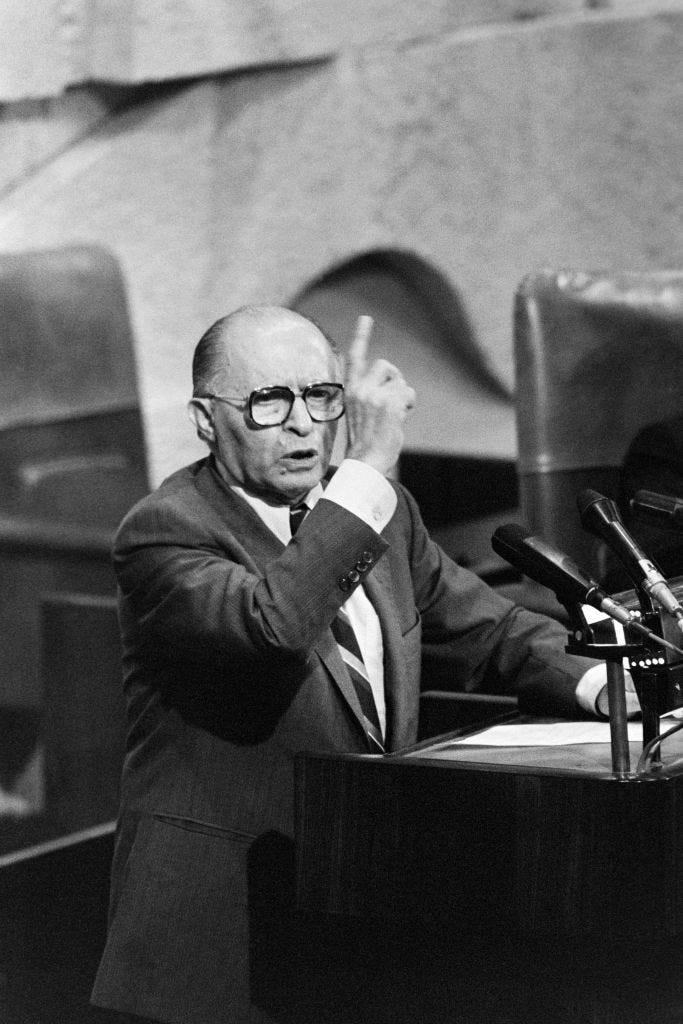
In postwar Glasgow, as I said, Begin was despised as a terrorist. But seen historically—for example, in Snyder’s Black Earth—Begin emerges as a logical response to the Holocaust.
Born in Brest-Litovsk, in what is now Belarus, and educated in Warsaw, Poland, Begin joined Betar, the youth wing of the Revisionist Zionist movement, which envisioned a well-armed Jewish state on both banks of the Jordan River.
Like many other Jews, Begin fled to Vilnius when the Nazis and Soviets invaded Poland in 1939. When Stalin annexed Lithuania, Begin was arrested by the NKVD, tortured, and sent to the Gulag—ironically for being an “agent of British imperialism.”
Freed when Hitler attacked Stalin, Begin joined the Free Polish Army under Władysław Anders. Because Stalin did not want Poles fighting on the Eastern Front—where they might be a source of future trouble—Anders’ army was sent from Soviet Tashkent through Iran to Palestine. It was there, in December 1942, that Begin joined the Irgun.
Today’s pro-Palestinians insist on describing Israel as a “settler-colonist” state. This is almost comically at odds with historical reality.
As the leader of the Irgun from October 1943, Begin launched a classic anti-colonial guerrilla campaign to drive the British out of Palestine. This came after the notorious White Paper of 1939, when Britain, fearful that the Arab world would support Hitler, abandoned its obligation to facilitate Jewish immigration to a reconstituted Jewish national home.
Unlike his more pragmatic rival, David Ben-Gurion—who declared that “we shall fight in the war against Hitler as if there were no White Paper, but we shall fight the White Paper as if there were no war”—Begin believed that only through armed struggle would a true Jewish state be forged.
First he fought the British, who he believed had betrayed the terms of the mandate they had received from the League of Nations, until they withdrew from Palestine. (The infamous bombing of the King David Hotel was more complicated than the atrocity I learned about as a child. Begin’s Irgun carried out the attack with the approval of the Haganah, the pre-state Jewish army, because the hotel housed British Mandatory offices storing documents taken from the Jewish Agency that linked the proto government to Jewish underground resistance. It remains unclear whether the Irgun’s message to evacuate was ignored or never received.)
Then Begin fought the Palestinian Arabs, who reacted to the General Assembly’s partition plan of 1947 by starting a war in which they were joined by the invading armies of five Arab nations. In June 1948, Begin even clashed with the fledgling Israel Defense Forces over a shipment of arms, a share of which he claimed for the Irgun. Ben-Gurion feared that Begin aspired to lead an independent Revisionist army. After sporadic clashes, Begin accepted the integration of the Irgun into the IDF and entered the democratic opposition.
And there he remained until becoming prime minister 29 years later.
For years, Begin and his Herut Party (a forerunner of today’s Likud) were viewed as extremists by the majority of Israelis. Many agreed with Albert Einstein and Hannah Arendt, who signed a letter describing Herut as a “terrorist, right-wing chauvinist organization.” Yet Begin’s insistence that Israel had to fight to survive was what ultimately got him elected prime minister in 1977, four years after the surprise attack by Syria and Egypt on Yom Kippur.
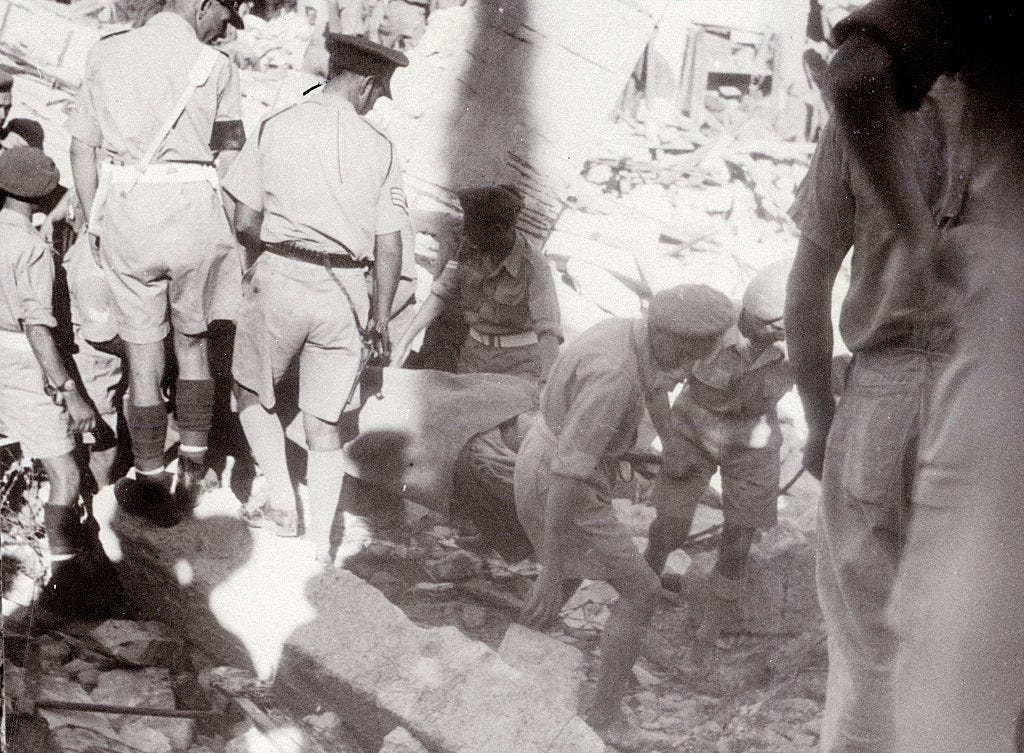
In some respects, Begin lived up to his reputation as a fighter. In 1981, he ordered the destruction of Saddam Hussein’s Osirak nuclear reactor, after which a miffed Reagan administration withheld the delivery of fighter jets to Israel. When Begin persuaded the Knesset to approve annexation of the portion of the Golan Heights Israel had captured in 1967—following the Syrian President Hafez al-Assad’s declaration that he would never recognize or negotiate with Israel—the Reagan administration suspended the memorandum of strategic cooperation the two countries had signed.
Begin’s response was characteristically defiant: “The people of Israel have lived for 3,700 years without a memorandum of understanding with America, and it will continue to live without it for another 3,700 years.”
Yet it was also Begin who, along with the Egyptian President Anwar Sadat, signed the Camp David Accords, exchanging land (the Sinai) for peace and recognition, and committing Israel to limited Palestinian self-government in the West Bank and Gaza.
Camp David was a historic achievement for which Begin and Sadat received the Nobel Peace Prize, an accolade vitiated only by Begin’s subsequent acceleration of Jewish settlement in the West Bank and Gaza, and by his decision, in June 1982, to send the IDF into Lebanon. There were good grounds for the incursion. Yasser Arafat’s Palestine Liberation Organization had created a state within a state in Lebanon that was firing rockets at communities in northern Israel, and unleashing terror attacks against civilians across the country. However, when Israel’s Christian Lebanese allies perpetrated the Sabra and Shatila Massacre, Begin’s political position began to crumble.
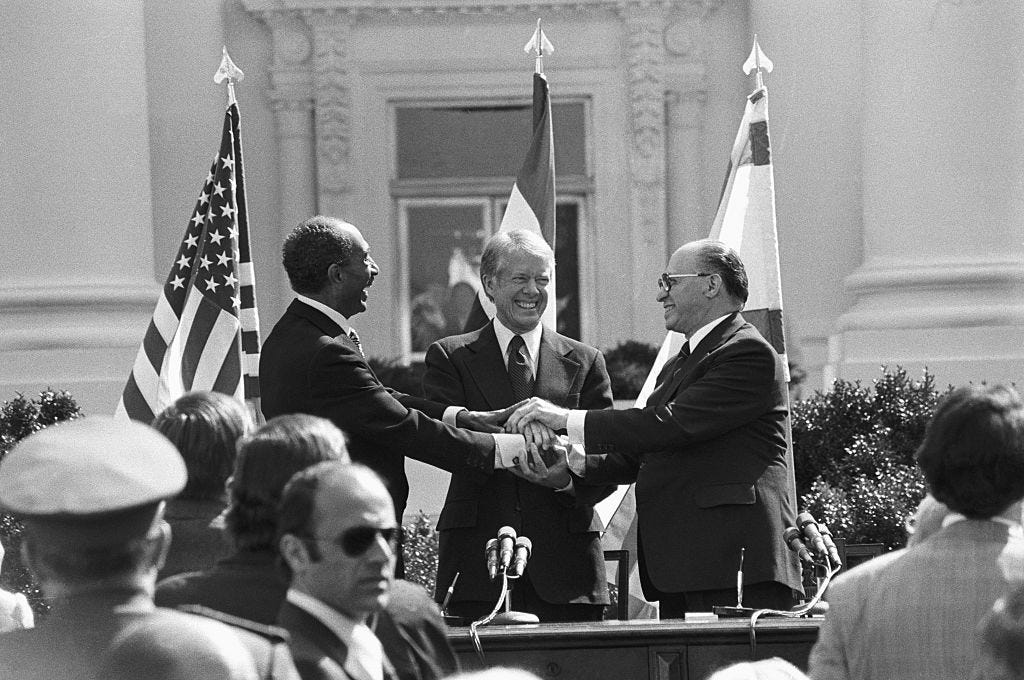
The Israel we know today is still in many ways Begin’s Israel, and Benjamin Netanyahu is his true heir, including of the dilemmas Begin faced. As both of their careers illustrate, peace in the Middle East between Israel and the major Arab states is attainable. The problem is the failed states (Lebanon and now Syria) and the non-state actors.
The project of a Palestinian state is doomed partly because the Palestinians have placed their cause in the hands of Islamists who would rather carry out genocide than build a functioning government. But there is a deeper, historical reason.
Unlike the Irgun, Hamas and Hezbollah went to war with a nation-state, not an empire. They both control the territory they occupy—in Gaza and Lebanon—although they serve as proxy armies for the Islamic Republic of Iran, a country whose imperial reach has already claimed portions of Iraq and Syria along with Lebanon. The murderous attacks on southern Israel that Hamas launched across undisputed borders on October 7, 2023, and that Hezbollah launched across undisputed northern borders on October 8, were motivated not by the desire to create a Palestinian state but by the dream of destroying the Jewish one. It was a similar commitment to preventing the birth of a Jewish state inside any borders, rather than forging a Palestinian one, that motivated the Arab rejection of partition in 1947, and the succession of wars against Israel the Arabs waged and lost.
In the end, the British were beatable; they could and did go home when the cost of running Palestine exceeded the benefits. But for the Israelis, there is no other home. There is no place to go back to. And the lesson of their history is very clear. The Jews can never again risk life without a state. They can never again be a people without an army.
This was why, as Tevi Troy recalled in the Wall Street Journal in 2020, when Joe Biden lectured Begin at a meeting with the Senate Foreign Relations Committee in 1982, Begin was defiant. “Don’t threaten us with cutting off aid to give up our principles,” he shot back at Biden. “I’m not a Jew with trembling knees.”
According to some accounts (there are no minutes of the meeting), Begin continued: “I am a proud Jew with 3,700 years of civilized history. Nobody came to our aid when we were dying in the gas chambers and ovens. Nobody came to our aid when we were striving to create our country. We paid for it. We fought for it. We died for it. We will stand by our principles. We will defend them. And, when necessary, we will die for them again, with or without your aid.”
While I was in Vilnius, I was given a fascinating book by a Lithuanian friend: The Peoples of the Grand Duchy of Lithuania. It has chapters on the Ruthenians, the Jews, the Tatars, the Karaims, the Roma, and the Old Believers. You will notice that five out of six of these peoples are without a state of their own (unless you count Tatarstan, a part of Vladimir Putin’s Russian Federation). The Jews are the exception.
Although my route was very different from Menachem Begin’s, my journey from the Jerusalem of the north to the true Jerusalem taught me why.

Niall Ferguson is a columnist for The Free Press. His latest book is Doom: The Politics of Catastrophe. Read his piece “The Treason of the Intellectuals,” and follow him on X @nfergus.
Comments are closed.
